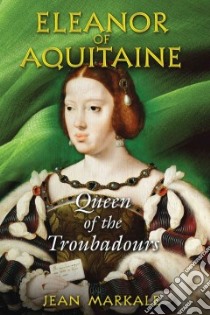Eleanor of Aquitaine - 9781594771958
Un libro in lingua di Jean Markale Graham Jon E. (TRN) edito da Inner Traditions, 2007
- € 15.20
- Il prezzo è variabile in funzione del cambio della valuta d’origine
A comprehensive view of the mythical and historic significance of the great medieval queen
• Explains that courtly love was not a platonic and intellectual affectation but an initiatic process of male transcendence akin to Tantra
• Shows that Eleanor’s embodiment of divine power undermined the pattern of patriarchy
• Reveals how Eleanor inspired the powerful influence of the Arthurian cycle’s figures
Eleanor of Aquitaine (1122-1204) has been long noted for her political and cultural achievements that profoundly shaped twelfth-century Europe. Culturally, beyond her role as wife of kings Louis VII of France and Henry II of England and mother of kings Richard and John, she inspired the huge diffusion of the Arthurian cycle and the Celtic myths underpinning it. Without Eleanor, figures such as Merlin, Arthur, and Guinevere (for whom Eleanor served as model) would never have assumed the enormous symbolic value they now possess. Politically, she embodied divine power that ended the dark age of patriarchy, playing a crucial role not only in the development of the Plantagenet Empire, but also in the granting of charters to merchants and craftsmen that led to the birth of the modern middle class.
But her greatest influence, still shaping modern sensibilities, was her role as the symbol of courtly love, which was not a mere diversion of the aristocracy but a process of male initiation and transcendence that bore a close resemblance to Indian Tantra. While the Virgin Mary was restoring a feminine face to medieval religious life, Eleanor embodied the adulterous queen who incarnates sovereignty--the woman who shares authority with the men who act in her name, but only after that power has been transmitted to them through an initiatory process leading to sexual union.
Informazioni bibliografiche
- Titolo del Libro in lingua: Eleanor of Aquitaine
- Sottotitolo: Queen of the Troubadours
- Lingua: English
- Autori : Jean Markale Graham Jon E. (TRN)
- Editore: Inner Traditions
- Collana: Inner Traditions (Paperback)
- Data di Pubblicazione: 26 Dicembre '07
- Genere: HISTORY
- Argomenti : Queens Great Britain Biography Queens France Biography Troubadours
- Pagine: 260
- Dimensioni mm: 228 x 152 x 25
- ISBN-10: 1594771952
- EAN-13: 9781594771958


